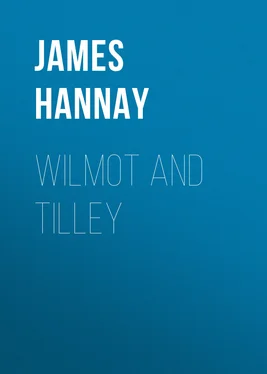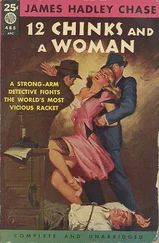James Hannay - Wilmot and Tilley
Здесь есть возможность читать онлайн «James Hannay - Wilmot and Tilley» — ознакомительный отрывок электронной книги совершенно бесплатно, а после прочтения отрывка купить полную версию. В некоторых случаях можно слушать аудио, скачать через торрент в формате fb2 и присутствует краткое содержание. Жанр: foreign_prose, foreign_antique, на английском языке. Описание произведения, (предисловие) а так же отзывы посетителей доступны на портале библиотеки ЛибКат.
- Название:Wilmot and Tilley
- Автор:
- Жанр:
- Год:неизвестен
- ISBN:нет данных
- Рейтинг книги:3 / 5. Голосов: 1
-
Избранное:Добавить в избранное
- Отзывы:
-
Ваша оценка:
- 60
- 1
- 2
- 3
- 4
- 5
Wilmot and Tilley: краткое содержание, описание и аннотация
Предлагаем к чтению аннотацию, описание, краткое содержание или предисловие (зависит от того, что написал сам автор книги «Wilmot and Tilley»). Если вы не нашли необходимую информацию о книге — напишите в комментариях, мы постараемся отыскать её.
Wilmot and Tilley — читать онлайн ознакомительный отрывок
Ниже представлен текст книги, разбитый по страницам. Система сохранения места последней прочитанной страницы, позволяет с удобством читать онлайн бесплатно книгу «Wilmot and Tilley», без необходимости каждый раз заново искать на чём Вы остановились. Поставьте закладку, и сможете в любой момент перейти на страницу, на которой закончили чтение.
Интервал:
Закладка:
RENEWED AGITATION
This despatch, which brought a sudden close to the negotiations with regard to the casual and territorial revenues of the province, did not emanate from the government with which the House of Assembly had been previously negotiating, but from a new administration which had just been formed under the premiership of Sir Robert Peel, and which lasted just one hundred and forty-five days. The creation of this administration was due to the action of King William IV, in dismissing his advisers on the death of Earl Spencer, which removed Lord Althorp from the House of Commons. The king had grown to detest his cabinet for their reforming spirit, but his designs were thwarted by the failure of Sir Robert Peel to form an administration capable of facing the House of Commons. As a consequence, Viscount Melbourne again became premier, and a renewal of the negotiations with the government in regard to the casual and territorial revenues was rendered possible.
The House of Assembly was still determined to keep the question of the casual and territorial revenue to the front, and at a later period in the session another address on this subject was prepared by the House of Assembly, to be laid before His Majesty. In this address the grievances with regard to the management of the Crown lands of New Brunswick were recited, and the willingness of the legislature to provide for the civil establishment of the province was stated. The address urged the benefits that would result to the people of New Brunswick from placing the net proceeds of the Crown-land revenues under the control of the legislature. Attached to this address was a schedule of salaries proposed to be paid out of the casual and territorial revenues, amounting in all to £10,500 currency. The address was transmitted to the governor to be forwarded to His Majesty. No specific answer was ever made to this proposal, a fact which was probably due to the confusion, incident to the change of government, which took place about the time the address reached Downing Street.
CUSTOM-HOUSE SALARIES
Another matter which engaged the attention of the House during this session, and in which Wilmot took an active interest, was the settlement of the salaries of the custom-house officials. Although the surplus revenue from this source went into the provincial treasury, the amount thus received was much less than it ought to have been, in consequence of the large salaries which were paid to the officials. In the year 1830 the amount of custom-house duties collected in the province was £16,616 18s. 11d. sterling, from which was deducted for salaries £7,073 6s., or nearly one-half of the whole amount. The House of Assembly objected to the payment of such large salaries, and in 1831 proposed to the British government to make a permanent annual grant of £4,250 sterling for the payment of customs officials in New Brunswick. This proposal was accepted, and in the following year a bill was passed in accordance with this arrangement. But it was protested against by the customs authorities in England and disallowed because the salaries of the officers of customs were not made the first charge on the revenue. During the session of 1835, an amended bill embracing this provision was passed, and the question was settled for the time. Mr. Wilmot was not satisfied with this arrangement, because it was a violation of the principle that the House of Assembly should have control of the provincial revenue, and he therefore voted against it. Nevertheless, the measure apart from this violation of a fundamental principle, was a gain to the province, as it placed a considerable sum additional in the public treasury.
CHAPTER IV
WILMOT AS A DELEGATE TO THE COLONIAL OFFICE
MR. WILMOT took a very active part in the proceedings of the legislature during the session of 1836, and was the moving spirit in the committee of the whole to inquire into the state of the province during that session. The result was the passing by large majorities of a series of twenty-six resolutions condemning the management of the Crown lands office, the composition of the executive council and also of the legislative council, and declaring that the control of the casual and territorial revenues should be placed in the hands of the legislature. These resolutions were made the basis of an address to His Majesty, which was to be carried to England by a deputation of two members of the House of Assembly. This address relates at length the principal facts of the management of the Crown lands and the reasons of the House of Assembly for dissatisfaction therewith. Mr. Wilmot, in recognition of the active part he had taken in this business, was appointed a member of the delegation, the other member being William Crane of Westmorland, a gentleman of experience, wealth and standing in the province. This appointment was the highest compliment that could possibly have been paid to Wilmot's capacity, for the negotiation then to be conducted with the colonial office was of the most important and delicate character, and one which vitally affected the interests of the province.
The colonial secretary at that time was Lord Glenelg, a statesman whose character has been drawn by Sir Henry Taylor, who was then a clerk in the colonial office. "Amiable and excellent as he was," says Taylor, "a more incompetent man could not have been found to fill an office requiring activity and ready judgment. A dart flung at him by Lord Brougham in 1838 points to his notorious defect as a minister called upon to deal with a crisis. The then crisis was that of the Canadian Rebellion." "It is indeed," said Lord Brougham, "a most alarming and frightful state of things, and I am sure must have given my noble friend many a sleepless day." It was probably because of Lord Glenelg's habit of procrastination that the delegates had to remain in London for four months before they were able to bring their business to a conclusion. They arrived there about the middle of June, and it was well on in October before they were able to leave. The result of their work was that an arrangement was made satisfactory both to the British government and to the delegates representing the House of Assembly, by which the casual and territorial revenues were to be transferred to the province, in consideration of the legislature undertaking to provide for a civil list of £14,500 currency annually, for the payment of certain salaries chargeable to that fund. A draft of a Civil List Bill was prepared and agreed to by the lords of the treasury, and the understanding was that this bill should be passed by the legislature, and receive the assent of the lieutenant-governor, when it would immediately become operative.
CIVIL GOVERNMENT BILL
The first clause of this bill transferred the proceeds of the territorial and casual revenues, and of all woods, mines and royalties which had been collected and were then in hand, or which should thereafter be collected, to the provincial treasurer, who was authorized to receive them for the use of the province, while the Act remained in force. The second clause charged the revenues with the payment of £14,500 for a civil list. The third clause enacted that all the surplus over and above the sum of £14,500 currency, should remain in the treasury of the province until appropriated or disposed of by an Act or Acts of the general assembly. The fourth clause gave the lieutenant-governor, with the advice of his executive council, power to expend such sums as they might deem necessary for the prudent management, protection and collection of the said revenues, a detailed account of which was to be laid before the legislature within fourteen days of the commencement of each session, with all vouchers for the same. It was also enacted that all grants or sales of Crown lands should be void, unless the land had been sold at public auction after due notice in the Royal Gazette . By this arrangement the House of Assembly had obtained the boon for which it had so long been contending, but there was still one more obstacle to be overcome,—the opposition of the lieutenant-governor, Sir Archibald Campbell, who had entered into a plot with some of the enemies of freedom in the province for the purpose of thwarting, not only the wishes of the House of Assembly, but also the intentions of the home government. As soon as Sir Archibald Campbell was apprised of the intention of His Majesty's advisers in England to transfer the casual and territorial revenues to the provincial legislature, he commenced a correspondence with the colonial office, pointing out what he deemed to be imperfections in the scheme which they had prepared for the management of the public lands. He pretended to have discovered that there was some error in the calculation of the lords of the treasury with regard to the sum to be paid in lieu of the civil list, and that the amount of £14,500 currency would not be sufficient to defray all the expenditures chargeable on the civil list.
Читать дальшеИнтервал:
Закладка:
Похожие книги на «Wilmot and Tilley»
Представляем Вашему вниманию похожие книги на «Wilmot and Tilley» списком для выбора. Мы отобрали схожую по названию и смыслу литературу в надежде предоставить читателям больше вариантов отыскать новые, интересные, ещё непрочитанные произведения.
Обсуждение, отзывы о книге «Wilmot and Tilley» и просто собственные мнения читателей. Оставьте ваши комментарии, напишите, что Вы думаете о произведении, его смысле или главных героях. Укажите что конкретно понравилось, а что нет, и почему Вы так считаете.












